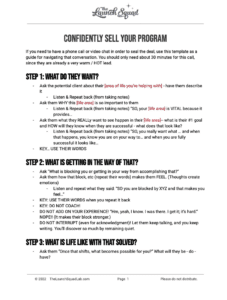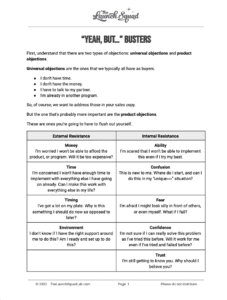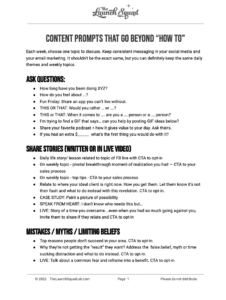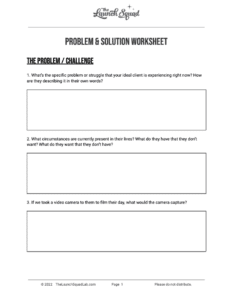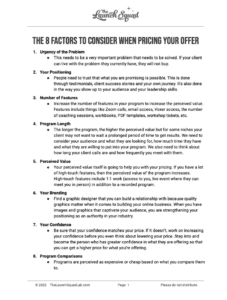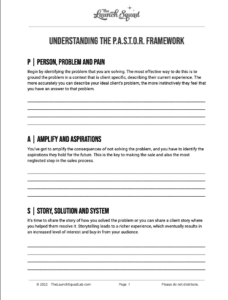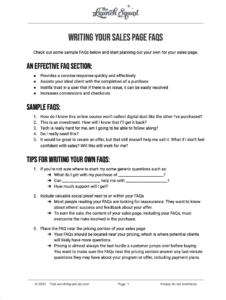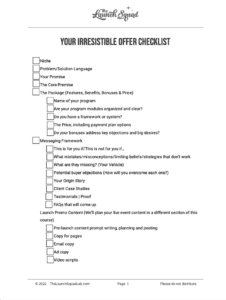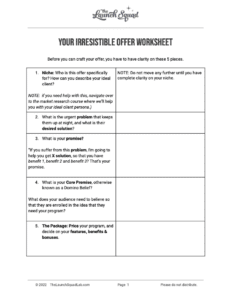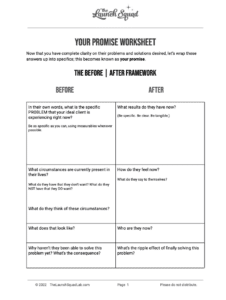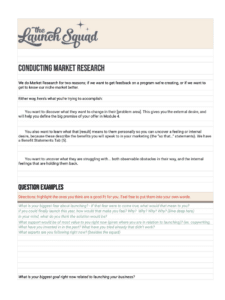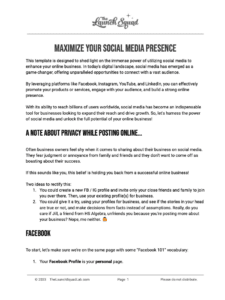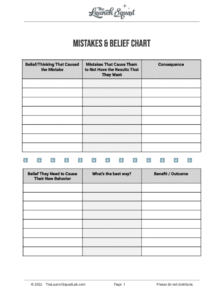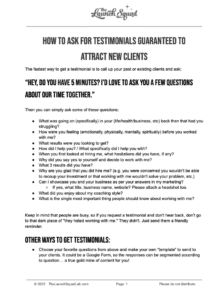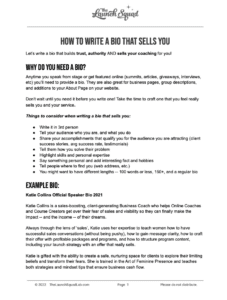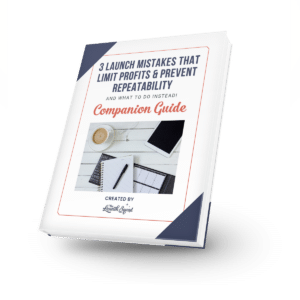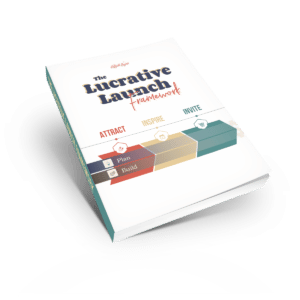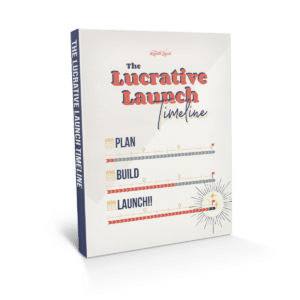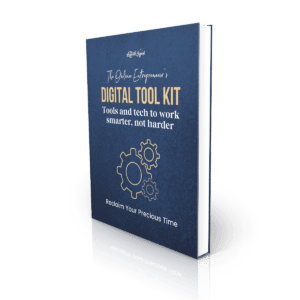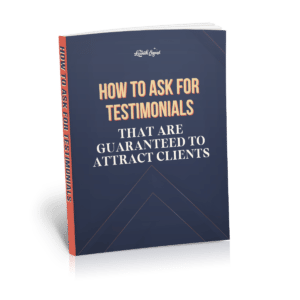Is part of you still hiding from your audience?
Are you whispering instead of shouting your hard-earned wisdom?
Is that pesky imposter syndrome still playing loops of ‘I’m not there yet’ in your head?
If so, you’re going to want to listen to this week’s podcast: 5 Ways to Show up as an Authority in a Loud Marketplace.
Grab a pen and paper (or a google doc) for this one-you’re going to want to take some notes.
Katie and Jeffrey drop so many helpful tips that are going to give you the boost you need to feel more confident in owning your well-deserved authority in your business!
Jeffrey: Welcome to the light in your launch podcast today, we're talking about how to position yourself as an authority in aloud marketplace. Stay tuned.
Announcer: Hey, we're in the Launch Squad and this is the Light Your Launch podcast. We teach coaches and course creators how to lighten their launches. We're bringing you all of the tips and strategies to take your launch from intimidating to money-making. In this podcast, we talk about everything; the sales, strategy, mindset, technical and spiritual aspects of running your best launch ever. So if you're feeling overwhelmed and unsure of the next right step, we're here to bring clarity, confidence, and excitement into your next launch. This is the Light Your Launch podcast.
Jeffrey: Welcome back to the show. I'm Jeffrey, the funnel master of the squad. And I'm back again with our sales superhero, Katie Collins. And today we want to talk about five action steps that you can take right now that will help you position yourself as an authority and aloud marketplace. So what we're talking about is how to position yourself as the guide. Now you, some people want to be the hero, but we don't want to be the hero. Our clients are the hero. So we want to position ourself as the guide that has the answers and the guidance so that the hero can conquer the villain. Katie kick us off.
Katie: Remind me of our storytelling podcast. Yes. So I hear a lot of our clients, you know, asking, you know, just the complaint about it being such a loud marketplace and how do you, how do you overcome the noise? And so we wanted to come to you today with really five action steps that you can take. And the first one is to take a stance that on something that you believe so firmly in and really shout out about it. The, one of the things I always talk about is people who are in business, but they hold up their mini sign and they're like,
Katie: If you want,
Katie: Right. And so then they're wondering how come I'm not getting any clients I'm like cuss Jack, you're whispering.
Jeffrey: You're whispering your message. And no one hears stop
Katie: Whispering. So we have to be bold. I remember taking on that word in 2015, that was my one word for the whole year, you know, be bold. And what does bold Katie look like? And bold, Katie learned how to take a stance and shout out about it. So it's like the shout from the rooftops. And you know, we're going to take several different stances. It's not like it's a one single stance that you always have to take, but, um, opinionated people bring in followers and turn away non followers. And that is good. So if you're striving for everyone to like you you're too vanilla, it's not, yeah. You're just, you're not serving anybody. If everybody likes you, then you haven't taken a stance and shouted out about it. And,
Jeffrey: And imagine what a world that would be if like everything was vanilla and you know, you had to agree with everything. And they had one, one size fits all world. Like that's just not, that's not what we want to live.
Katie: And you know, let's just face it. When it comes to sales, you, you are maybe changing someone's mind. You're helping them come to the belief that they need, the thing you have. And so you have to take a stance and say, why you're the best and you don't have to be narcissistic about it. And in fact, what we're teaching you here today are ways that you're showing up saying, you know, Hey, listen to me, I'm the best without actually saying I'm the best right? We're showing. So here's an example of taking a stance and shouting about it. Um, back in March of 2020, when the world was shutting down rapidly with this whole COVID thing, um, you know, sales were getting lost. Clients were canceling. Everyone was just kind of like shutting their purses, so to speak, right. Um, people were getting laid off or, you know, we just didn't know what was happening.
Katie: And there was a lot of fear setting in, and I, um, was working with a coach at the time. And I remember feeling, and I'm not really a shy person, but at that time I was feeling a little shy about putting myself out there and saying, keep selling, even though we're in the global pandemic, I wanted to know that other people had that opinion too, but it wasn't like you could find a blog post on what we did last year when we had a global pandemic, because we hadn't had one ever in my life. Right. So there was no playbook. There were no opinions that I could read or feel solid about. Um, but what I knew from my own training and my own work that I've done as a coach is to not impress or project our money fears or the money fears of our family into our business.
Katie: And assuming that the people that we're selling to also have these, you know, Oh, their husband also got laid off or whatever, you know, so I did have a stance, but I think I was afraid to shout it out. So my coach had said, Katie, pick aside and shout it out because it's the people that are waiting to see what happens are the people that are not going to make any money in March, April. So if you want to be a person that's keeping her business afloat in March, April, may then, you know, claim a stance and shout about it. So that's what I did. So I started talking about why you shouldn't feel guilty for trying to sell during this global pandemic. And then I brought in a heart-centered approach because that's what I stand for. So heart-centered sales does not try to re-enroll somebody, if they're telling you that their husband just lost his job, it's not the time to say, well, you signed the contract and you owe me $1,500 a month, you know, sorry to hear about your husband.
Katie: Um, let's get you some clients. And that's just not my way. And, and other people are. Um, but that was something that turned me off. So I took a stance against those kind of Voltaren companies that were demanding pay in the middle of a global pandemic. I kinda thought, you know, I'm gonna bless anyone who needs to leave my coaching. I'm going to bless them and wish them well. And I'm going to invite two new clients in for every one that might cancel, I'm inviting two new in. And I just kept my abundance mindset on track. And I still had a very good year in 2020. It wasn't my best year, but I stayed afloat and, you know, I did pretty well. Um, so, so that's just an example of being bold enough to take a stance and shout about it because when people agree with you, they know they're in the right camp, so to speak.
Katie: And then if people didn't agree with me, then they left my world, which was perfectly fine cause they weren't going to hire me anyway. Right. Um, but I gave other people permission to continue to sell. I was the leader that gave those people permission. And I was told later that people were tuning in, I did 30 days of lives in that month of March. And people were saying that they were glad that I was doing that because they were tuning in kind of getting their own tune up if you will, of their mindset and the beliefs that were holding them back from doing what they need to do in the middle of a time where we've never experienced something like that before.
Jeffrey: Yeah. And coming from the heart centered perspective, like that's a really, so that taking that bold action, that's a real benefit to people out there because I feel that there was a lot of people during this early stages of COVID where they were looking for some sort of guidance, they were wondering what was happening, what should they be doing? And, and that that's a vulnerable place. And, uh, just to, just to be in the presence of somebody who's taking a stance and saying, it's going to be okay, you know, that's, that's helpful. I think that in itself is helpful and so kudos to you, Katie for being that authority. Thanks. So, and, and then another aspect of this that, uh, when, when we say, you know, stand up and shout and take a stance, like I know that for a lot of people that can be fear inducing, like it's, it is a vulnerable place to say, listen, this is what I stand for. And I'm going to stand behind it as the expert. And I think what this brings up for a lot of people is that imposter syndrome like, well, am I an expert? And you know, do I, is this my stance?
Katie: And who am I to claim that?
Jeffrey: Right. Yeah, yeah, exactly. Who might've claimed that. And I would want to say to that, that it is it's, uh, it's, it is, uh, a stretch for some people and you really have to shift that focus, um, away from yourself. Of course, that's a vulnerable place. And you know, if you're feeling uncertain, shift that focus to your audience, shift it to them and how you can support them. Because as I just mentioned, you know, Katie is going to be the authority to take a stance and say, you don't, we're going to be okay through 2020, that's comforting. That is a service to her audience. And so for you to show up from your heart centered position and serve your audience, they want to hear your stance. They want to hear what you believe in. And here's the thing. If you're 10% ahead of somebody else, you're the authority, you're the expert in that field. And, and, and all that really means is that you, you truly do have the potential to help others. And that's really what it is about anyway. Right?
Katie: The fear of, you know, who might it be this authority, or what do I know? Um, you have to come from this place of what have I been able to achieve. Yeah. Yeah. And then learn how to Pat yourself on the back about that. And I think a lot of women really struggle with that. You know, we weren't necessarily raised to brag on ourselves. And so it's, Oh, that's just, you know, like I remember, um, when I had quit my job, like, so in, in a very short amount of time, I quit my teaching job. I sold the home. I lived in, I packed up everything. I owned and I moved to California. Um, and I had so many people reflect back to me as then, then I flailed around and nothing was going as planned, but I was kind of a hot mess when I first, you know, six months or so there I'm like, what did I do?
Katie: You know? And, but to have people reflect back to me, do you know how courageous that was? You put all that money from your home, into your business. Like you bet on yourself in this huge way. And I was just like, I don't know. I kept blowing it off. Like it wasn't that big of a deal. And it's like, it's a big deal. It is. So let others reflect back to you. If you aren't good at bragging on yourself, let others reflect back to you. What makes you amazing and then start learning how to tell stories about it?
Jeffrey: Absolutely, absolutely. And that kind of brings us to our next, uh, our next action step here is, uh, posting testimonials and client success stories.
Katie: So this one is so big. And, um, again, you bring up that word brag, right? Like, Oh, I don't want to come off bragging. Um, and the thing is, if you're not doing this, then you're not building trust. People don't necessarily know. Um, are you really doing work with people? Are people actually hiring you? And if they are hiring you, are they getting results? What are the actual results? So it's not necessarily about, Oh, you've got a brag about yourself. It's really, I've got to show my audience. I know what I'm doing and I'm getting results and it can not always come from your mouth. So that was like the first point we wanted to talk about was you want your stories to focus on your client instead of yourself. And so, you know, I was sharing with Jeffrey, um, you know, not anyone in particular, but say, they're just, I see a lot of women that kind of put their gorgeous photos up.
Katie: And every post that talks about a client success has a picture of the coach, herself in her gorgeous setting, um, in her great dress in her hair and makeup, you know, yada, yada, and those are great. And they're, and they're, um, eye catching. But when that's the only type of image that you put with those posts, your audience gets bored. There's no variety there. And so it can't always be about, you look at how beautiful I am in this photo. Oh. And my client got this great result. Right. They did something to, yeah. Oh, but I'm going to show you a picture of me, not her. So we've got a variant and, and you know, of course always get someone's permission before you post their photo, but varying it so that you're posting, um, stories sometimes or actual verbiage from somebody, you know, I remember one time I posted something in the verbiage was Katie. When I first met you, I thought you were crazy. And now, like, I can't believe that I did it. That was huge. Right? Like that was a funny, I was like, I'm going to put that out there. I bet
Jeffrey: Worse.
Katie: But that belonged with, you know, an image that had that quote, not with me looking beautiful in one of my images. Right. It was way more impactful to have that quote printed in a big, beautiful way.
Jeffrey: And I want to touch on that also, because there's a fine line. I feel there's a fine line between boasting bragging and sharing stories of your client and, and people know, people know this, so it's an art form, you know, there's a subtlety to it. Um, and I would just say, you know, w when you're creating these stories, get right with yourself, get right with yourself and your position in the story. So, for example, going back to those, you know, examples, Katie was just sharing where somebody is out there. Like here, here I am. I'm so beautiful. I'm so good. And I did this for my clients. I helped my client do this. Like, that's that, that energy of that is boastful, right. Versus so-and-so got these results, right. So-and-so achieved this. Those are very client focused. And, and here's the thing, the underlying perception of that story is that you were the guide. And that's the whole point, like when, when Luke defeats the Darth Vader, um, I'm losing some audience here. I know my, for, for that guy out there
Katie: That I'm talking to a geek, doesn't eat
Jeffrey: Well, you know, nobody was like, Oh my God. Yeah, Yoda, you did it. Yoda. Yoda did it. No, Luke's the hero. Right. But we all know Luke, didn't get there. If it weren't for obiwan right. Or it weren't for Yoda. If Luke didn't have the guide, he wouldn't be able to fulfill the story. Right. He wouldn't be able to be the hero. And it's unspoken is, I guess that's what I'm saying. It's that unspoken part of the story that you don't have to talk about. Right. So when you're, when you are sharing stories of your clients, you're automatically positioning yourself as a guide without saying a single thing,
Katie: Right. About yourself. Our very own Amy Green sky helped me. I remember at one point, um, you know, we were talking about testimonials beyond us. Like we got them to a certain place and I was kind of stuck in the, like, the testimonial has to be here. I got them from point a to point B. I got to talk about point B. But what happened after point B, when they're at point G they couldn't be at point G without Katie Collins, getting them to point B. And so being able and willing to tell stories that go beyond the work you did. And again, it's giving yourself permission to say, I helped them get there. It's not certainly all me, but I helped them get there. And people like to hear the after story. They liked the epilogue, if you will. Um, don't always think that it has to be something current.
Katie: Um, but you know, they went on to XYZ. So, um, all of these testimonials and client success stories, you know, you should be as an action step, collecting them, posting them. Don't be afraid to post it more than once. Even if you recycle it through every six months, that's okay. It's still true. It's still happened. And nobody saw it the first time. Right. Right. And you've got new audience and, you know, likely, no one's even going to remember it. So don't be afraid to, to repost. Um, but definitely if you can, I noticed for my sales pages, I got more excited the next time around, cause I got better testimonials or more applicable testimonials and I can update things. So, you know, be willing to, to always update, but keep a file. As the launch squad has all learned. Cause we've had to come up with our own testimonials and those of us that kept a file versus those of us who didn't, it took a little bit longer. So get that folder starting right now. Nope. We're not naming any names, Jeffrey. Okay. Um, we wanted to touch a little bit about, um, headlines that you can use when you're talking about success stories, because truly the headline is what people are going to stop and read. Um, so Jeffrey, do you want to go into that a little bit? What needs to be in a good headline?
Jeffrey: So some of the structures that seem to work, uh, is kind of, uh, an audience identifier, a hook and example. Um, so for example, uh, we could say, uh, meet the life coach who launched once and covered her bills for the rest of the year. And we're kind of structuring like who, who, who we're talking about. Right. We're talking about a life coach and what did they do? Like they launched once and then, you know, cover their bills for the rest of the year. Right? So there were kind of putting that formula together. Uh, another one is, uh, how Mia frees herself from launch overwhelm and what small change made her five X her next month. Those kind of grab you a little bit and it kind of lets you know, who we're talking about.
Katie: Right. And so, you know, when you think about posting something like this on social, your headline can be a graphic post that you make in Canva. And then the story itself is going to be in the post. Right. But making that headline also a graphic gets people's attention and they're going to want to read your post. So it's really important to have an image with your posts. They just get so much more attention. And I think they play with that algorithm, the beloved Facebook algorithm a little bit better as, um, okay. So a third way that you can show up as an authority in such a loud marketplace is really taking the time to do a self audit of your, um, what you look like online, your branding. Like what, when, when I go to your business page, maybe your group, if you have one, your personal page, your IgE profile, um, and when I go to your website, do they look and sound the same?
Katie: Are they speaking to your avatar? Um, sometimes, you know, I'm getting my website updated right now. It's like, I CA I can't remember if it was created in 2017 or 2018, maybe. Um, and it just feels outdated. It's speaking to a group of people that I'm not, that I'm not really focusing on anymore. So it's time for right to update that. Um, but so we're not talking just looks, but we're talking voice and message, um, that you stand for the same thing, no matter where you are. And then to my biggest pet peeve online is to actually tell people on your personal profile, what the heck you do. A lot of people will add their job. You know, Hey, I'm a store manager at XYZ store and you need to link the store or I'm, you know, a director of marketing at, at wherever. So as entrepreneurs, I don't know who set the trend where people write works at and then cause well, Facebook writes work at works at, and then you can write whatever you want and people will write entrepreneur and loving it or self-employed and loving it works at self-employed great. Doesn't tell me a thing about you. I can't find you. I don't know, you know, w w where is that? And I mean, I see it all the time, literally all the time, um, when I'm welcoming people into groups or doing sales for other companies, you know, and I have to do some quick research on somebody to send them a direct message. And I'm like, okay, your personal profile literally told me.
Jeffrey: Yeah. If, if you're, uh, if you are an employee of yourself, uh, the up question is, uh, what's the business your boss owns, right. Cause that would tell us where you are.
Katie: Right, right. And so a lot of people don't realize, you know, you can, as long as you have a business page, you can start typing in your business page name, and Facebook recognizes it as a workplace. So mine says that I work at the launch squad and it says that I work at Katie Collins coaching. Um, so, you know, it's not that hard to do. And it's just a little bit, uh, a little step. Um, and S I don't know, some people have learned to not do that for some reason. So I'm taking a, I'm getting loud and proud, proud, and I'm saying, tell us what you do on your personal profile. And why do I think this is so important? Because as somebody that built a six figure business through all organic marketing, I am telling you that when I interact in groups and I answer questions and I provide valuable feedback for people, what do they do?
Katie: Well, first of all, I'm in the group as Katie Collins. And so they're going to click on my profile and go, wow, who is this amazing woman who's dropping truth bombs left and right, right. Navy. They loved what I had to say. And so they're going to come on over to my personal profile, cause I'm in the group as my personal name. And if I don't have a place to send them in that profile, they're going to click away. But instead I have images that say, I've got a Facebook group, join me here. I've got one business page click over here. If you, you know, I changed my cover photo to say, if you're interested in this click here, if you're interested in that click there, you know, two different businesses. Um, but I, I think it's so important as a self-employed person to tell your people, lead them down the pathway of how to find you. And that is what I'm talking about. When I say audit yourself and make sure your links work.
Jeffrey: Yes. And imagine, imagine, and this is, this is the case for a lot of people out there, right? You you're actively engaging and you're helping people in Facebook groups. And when they get to your, and they, they, uh, they like what you're saying, well, let's learn a little bit more about this person and they clicked to your profile. And you're just, you're just not letting them know how you can help them and what you do. Like, that's just like a, a big let down. I'm like, Oh, here's Katie. I guess she just is a person that is smart.
Katie: Well, and, and like, Oh, here's Katie who showed up as a huge authority in this group. But over here in her Facebook page, she's holding out her little, sign-ups our business, quit doing that. Quit to stop doing that, stop doing that.
Jeffrey: And first of all, let's back up a little bit. If you don't have a brand, you feel like you don't have a brand go back and listen to episode 14, where we talk about building a powerful, authentic brand with Amy Green sky. Just throw that out there.
Katie: Definitely. Definitely, always be, if you haven't listened to every single episode we've done so far. No, it is super flattering when people say, Oh, I binged watched. I almost said, but they didn't watch my podcast, but right. Like I binged listened to your podcasts, you know, I'm like, yay, awesome. All 17, which I think is pretty dang good since we just came out here in January. Amen. Okay. The fourth one is learning how to write stories that sell you. And so we're going to break that down. So a couple of different ways that you can tell your own story that sells you. Um, the first is making sure that you have a good bio. So, um, here's the thing, like, I have been a part of, a lot of giveaways at this point and, um, summits, you know, I got interviewed for a series or whatnot, and people that have dealt with me before they know that they can come and ask me today, like, Hey, do you want to be a part of this?
Katie: And are you ready to go? Sorry for the last minute I need this stuff like right now and I'm ready. I have my bio, I have my picture. I know exactly what my gift is. I have the title, I have the mock-up, I've got my links and my whole funnel with my emails is all already set up. So they know that about me. Um, that is such an important way for you to be able to show up as an authority anyway, to have those things in place so that people know they can count on you. Because a lot of times when they're filling those events, it's not easy to find 30 people to participate. And they may have set a goal for 30, but they're only at 25. So if they had lists requirements, those lists requirements are down by the wayside. At this point, they're just, they need bodies.
Katie: They need faces in those circular images that say I've got 30 people in my giveaway. Um, so being ready for that, but that, so part of that is writing a good bio. Um, so I talk a lot about, you know, what is your bio have to have for you to be able to stand out and have it, have it feel impressive for people. So Jeffrey and I were talking about this earlier, you know, does it have to be written in the third person? Most bios are certainly if you're being introduced on stage, you want it to be written in the third person and it's supposed to really be positioning you. And so it has to of course, tell your audience who you are and what you do right in the beginning. And then you've got to share your accomplishments that qualify you for the audience that you're attracting.
Katie: So that might be an average success rate. It might be a quick success story. Like for example, Katie's client Chris who tripled her income in 90 days of working with her, right. Not a big story there, but a poignant sentence that says a lot, um, or, you know, testimonials in general. But you know, it's, I remember writing my first bio and it was like, you know, Katie Collins has a bachelor's degree in psychology and a master's degree in education. Well, nobody cared. I was trying to be a life coach. Nobody cared that I had a master's degree in teaching language literacy and culture. Um, so you gotta make sure that your accomplishments qualify you for what you're doing, if they don't. And you feel like you really like you have a PhD and the PhD is valuable, no matter what the PhD is in, you could certainly put it in your bio, but I wouldn't lead with it because it just turns people off.
Katie: Cause they, they go, Oh, what does that have to do with me? So you want them to be listening to your bio going, Oh, that I can connect with that sentence. Oh, I can connect with that next sentence. Every sentence is deliberately connecting with the very people that you want, that you want it to be. Um, also in your bio, you want to tell them how you solve their problems. So it's creating that empathy in that underst I know who you are and what you're, what you're suffering from. And I help. So mine says something about, um, you know, helping coaches and online experts overcome their fear of visibility and sales. So they can finally make the income and the impact that they came here to make. So I'm telling them, you know, I'm solving that problem by helping you overcome your fear and then of course highlighting skills, personal expertise.
Katie: Um, and then it's always fun if you add something personal and like interesting facts and hobbies, I can't tell you how many people will comment on things like that later when they talk to me, like, I think on my website, I said that like, I like to pair my outfits with cute shoes. And so, you know, a fellow shoe freshly natto will come up and be like, Oh my God, I love cute shoes too. And like any sort of connection, I'm a one on the Enneagram too, or, Oh, I saw you're a Leo, you know, and that's what this means to me. Right. I always glad you're a Leo or something like that. So, you know, things that you don't think are a big deal actually create really great connection with other people. Um, and then of course you want to tell them where to find you at the end of that.
Katie: And one last thing I want to say about the bio is I've learned that, um, I have different lengths, so I have a a hundred word bio. I have 150 plus word bio, and then I have a regular bio that might be up to 300 words. I find bio is longer than that. Everybody tunes out, especially when they're getting read aloud, if you're going to speak on stage, it's too much. So I really like to succinctly say who I am and a hundred words and often that's the bio I submit to people. So, um, so yeah, so that is one, if you don't have a good bio already, um, and you may have one, take it out and just read it and see if you can update it. Um, you know, originally my bio had said that I was flexible for selling over $4 million in coaching packages. And now I've bumped up up to four and a half million dollars. So I've been selling this whole time and Oh, I can increase that. Or, you know, I helped hundreds of clients at this point, thousands of clients. So what are ways that you can increase some of those quantifiable things that you've put in there? Um, just to keep it updated.
Jeffrey: And even though I got the aviators award in space camp, when I was 15, that's not really helping me help you. So I'd put that at the end.
Katie: I like that you slid that in there. And because, you know, we chatted with Alayah his lovely wife Aleia she won the spelling bee in 1986. Yeah. Yeah. And you know, I was, I was joking with her saying, no, we need to write that in your bio because you're helping with copy. And that matters. Right. But that kind of stuff, I mean, it just makes you smile. You remember spelling bees, it's so fun. And it's like, sometimes we hold onto that, like you win. Yes. I won teacher of the year twice, but I've taken that out of my buyout because nobody cares. We care. Thank you. It's very exciting. Thank you. Yeah. But it's really fun though, to be able to make a list of your accomplishments and whether they make it into your bio or not, they just make you feel good. Right. You've got to remind yourself of your own awesomeness, if you want anyone to see you as awesome. It starts with you.
Jeffrey: Yeah. And, and, and here's, here's kind of where the hero's journey, where, where you do get to share your, your hero's journey, if you will. Um, but I want this to be understood that your bio and stories that sell should always be focused on your clients. So if you're bragging or not bragging, but if you're sharing something that you accomplished, it should be something that they want to accomplish too, or something like that. So in a, in a general sense, there's a couple of formulas you can kind of stick to that, uh, might help you write stories or bios that that helps sell. Right? So one of them is the high point, low point turning point high point. And another one is just going to cut off the first high point and stick to the low point turning point and high point. Now what this is doing is it's kind of in general terms saying, I know how you feel.
Jeffrey: I felt that too. And here's what I've learned. And now here's where I am. So if you, if you solve a problem for somebody you're telling them, you know, I hear what you're saying. I understand your struggles. And I, I was there too. Right? And then this is what I learned or did or changed. This is how I transformed. And here's where I am now. Right? So you're sharing, or this is what I built. You could say, this is what I built. So I made this program or something. Right. So you're sharing that you empathize with them, you're relating them. And then you're showing how you overcame the obstacle. And that is again, positioning you as that guy. So literally in your hero's journey, you're positioning yourself as a guide for somebody else.
Katie: Yeah. That hero's journey is huge. I remember kind of breaking it down. Like the high point. You would only want to start the story with a high point. If you haven't already established your positioning or your authority to whomever you're speaking with. Right. Because you want to give them a reason to consider you as an authority before you share your story. So, you know, like I, you know, I built a six figure business on organic marketing alone, and I've learned a few things along the way, high point. Right. And then, and then going into the low point, it's kind of telling that essence of it, wasn't always this way, but I always joke. I came from a community that taught that. And so then everybody's story was, but it wasn't always this way. It makes me want to throw up when I hear it. Right.
Katie: Because it's like, okay, we got to vary that up a little bit. You know, when I look back on who I was just, you know, insert length of time ago, I can't believe how far I've come says that the same way, but different. So, um, so, but getting into the low point and S and the essence of the low point is, um, I know where you, my dear audience, I know where you are because I used to be there too. And then you go into your turning point, which is basically saying, then I did this thing I'm about to ask you to do so, you know, then I called the coach. Then I booked a consultation, or then I, whatever, whatever that is, right. It may be some Munis school. Like I booked single appointment, or it maybe, you know, I learned how to sell right.
Katie: Then I learned a heart-centered approach to sales. Right? I did this thing that I'm about to ask you to do you, should, you two, should learn the heart centered approach to sales. Um, but that's the turning point where you're the guide and you're leading them onto their own hero's journey story. So I always say like, that's the guiding light. Um, and then we land on a high point, which is now I'm in this awesome place that you want to be in, and I'm going to show you how to get there, trust me. So that's the essence of that hero's journey story. And it, and so, you know, there's just two ways to tell it, you can do the feel felt found, or, you know, this, this essence of the high point, low point turning point high point, um, framework, but either way it's telling the story that your clients would see themselves in it. Yes. And leaving out the details that aren't necessary,
Jeffrey: Unless it's a trophy for flying a simulator really, really good at age 15
Katie: Jeffrey, if you got to put it in there, put it in there.
Jeffrey: Okay.
Katie: All right. The fifth way we wanted to, and really action step that we wanted to encourage you to do so that you can make sure you're showing up as an authority in this loud marketplace, we call the internet is to audit your free gift, that lead magnet that you have to make sure that it's reinforcing your authority. So what do we mean by that? Well, are the stories that you're telling and the testimonials that you're talking about and the, you know, domino belief in vehicle and the stance that you're taking, all of that messaging, is it reflected in your free gift? Oftentimes it's not because you created your free gift in the beginning because many, many coaches out there recommend that you do that. And we don't recommend that. And you should listen to episode 16, very quick episode, that we broke down, um, that lead magnet and why we don't recommend that you do at first.
Katie: But in fact, you would, after, you know, what your offer is, but all that said, you don't have to have only one lead magnet, but making sure that what you're putting out there, um, is making a case for the vehicle that you're talking about right now, and that it's going to attract to you the buyers of what you're trying to sell. And a lot of times they're not really related, or they're too vague, 10 ways to improve your health too vague, who's it for? Right? Like they can, they can read a blog post about that on the internet. Why are they going to give you their email address for something like that? Yeah. It has to be so much more enticing and specific with the hook and the headline and all of that jazz. Um, but that is truly how you're claiming your authority is by providing people with a free gift. That's super valuable that they really want to get that allows them to see you in your brilliance and what they need to learn from you and what they can learn from you.
Jeffrey: And here's the thing, the better you can address that dominant belief and the better you make a case for your vehicle, the more you stand out as an authority, that's really the bottom line. That's really it. Like if, if you can articulate their problem and address that belief, they believe you have the answer, right. So if they believe you have the answer, that means you are the authority. So,
Katie: Okay. So let's wrap up our five action steps. All right. Where are we asking them to do? Go for it. Jeffrey,
Jeffrey: Let's do this. If, see, if I can remember this,
Katie: Get out your pen and paper, write this down teacher. Katie's got her teacher hat on.
Jeffrey: All right. So first take a stance and shout about it. Get loud and get proud, right? And two, we want to, um, post your and client stories. Three, you want to do a self audit, uh, for consistency and branding. First of all, get a good brand if you don't already. Uh, and then if you do, when you have that great brand, put it everywhere, everywhere. And then four, we want to write stories that sell. We want to make sure your hero's journey is, uh, positions you as the guide to their journey, and then finally audit your free gift so that you are sure to address that dominant belief and that vehicle. All right, thanks for joining us. If you enjoyed this episode, please leave a five-star review and hit that subscribe button. It really does help us out. You can check out all the show notes at the launch squad, lab.com forward slash episode 17. Thanks for listening.
Announcer: Hey, thanks for listening. If you'd like to have clarity, confidence and excitement around your next launch, join us in the Lighten Your Launch Facebook group today at thelaunchsquadlab.com/facebook. We also invite you to download our free gift, the Lighten Your Launch starter kit, the free guide to creating an irresistible offer, pricing it right, overcoming tech barriers, and tapping into the energy you need for success. Get it now at thelaunchsquadlab.com/freegift.
Be the first to know
Enter your name and email and we'll let you know when new episodes release.
About the Show
The Lighten Your Launch Podcast is for Coaches and Course Creators who want a lighter online launch experience. Maybe you’ve done a few launches already, and feel exhausted just thinking about it! Or, it’s been one of your goals, but you don’t know where to start.
Tune in to learn from our team of experts, The Launch Squad, who aren’t afraid to dig into all aspects of launching: sales, strategy, technology, mindset, funnels, and even a bit of woo to get you through the toughest times. Let’s put a stop to perfectionism and procrastination, and finally take your launch from intimidating to money-making!

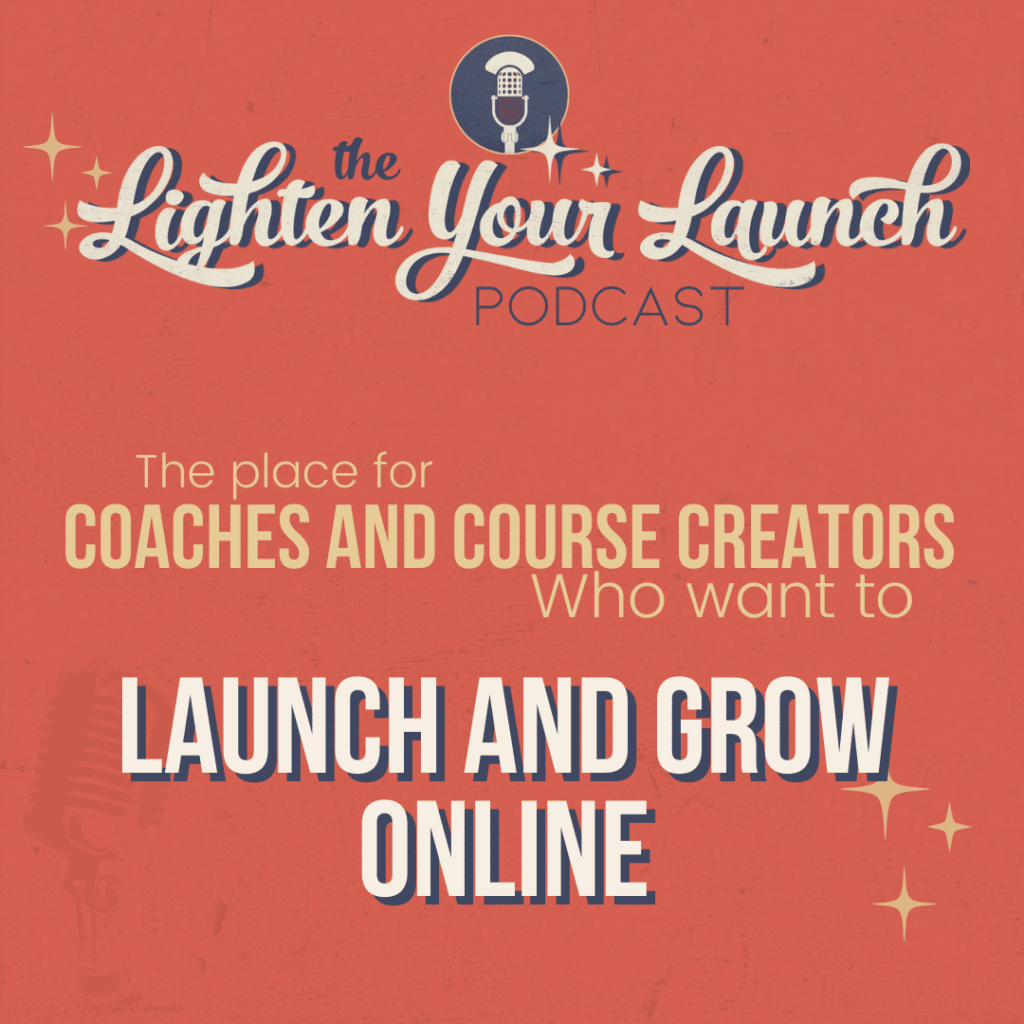
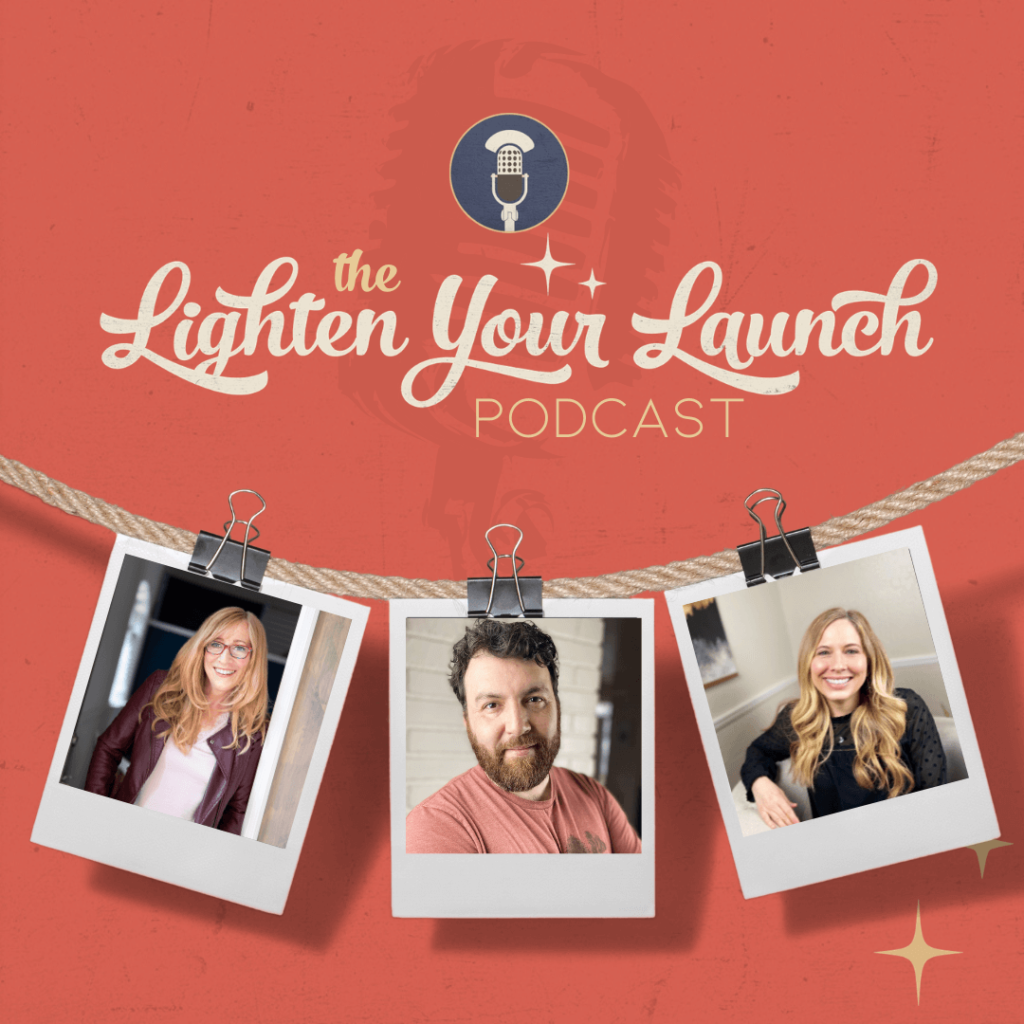


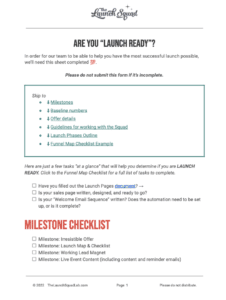
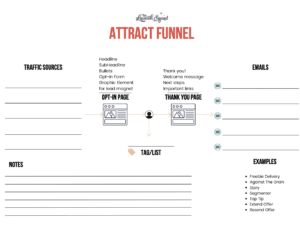
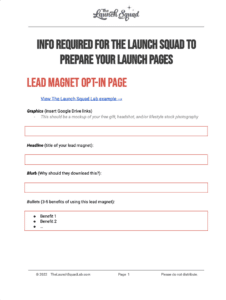
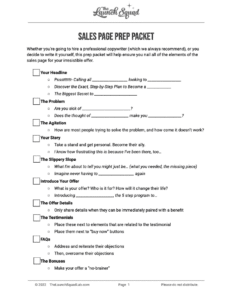
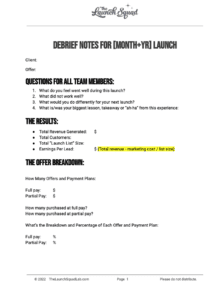
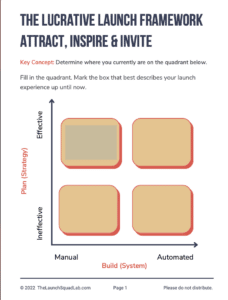
![Marketing Launch Calendar [TEMPLATE]](https://thelaunchsquadlab.com/wp-content/uploads/2023/05/Marketing-Launch-Calendar-TEMPLATE-300x260.png)
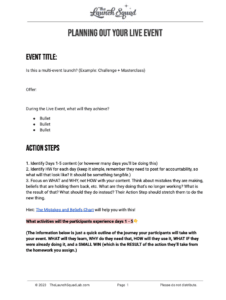
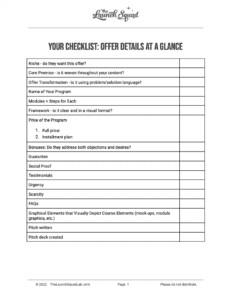
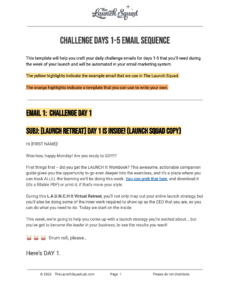
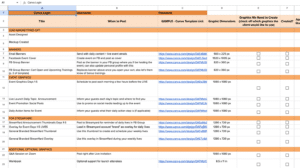
![[Updated] Email Templates for Launch](https://thelaunchsquadlab.com/wp-content/uploads/2023/05/Updated-Email-Templates-for-Launch-223x300.png)
![[REVISED] LS Pitch Script](https://thelaunchsquadlab.com/wp-content/uploads/2023/05/REVISED-LS-Pitch-Script-2023-226x300.png)

